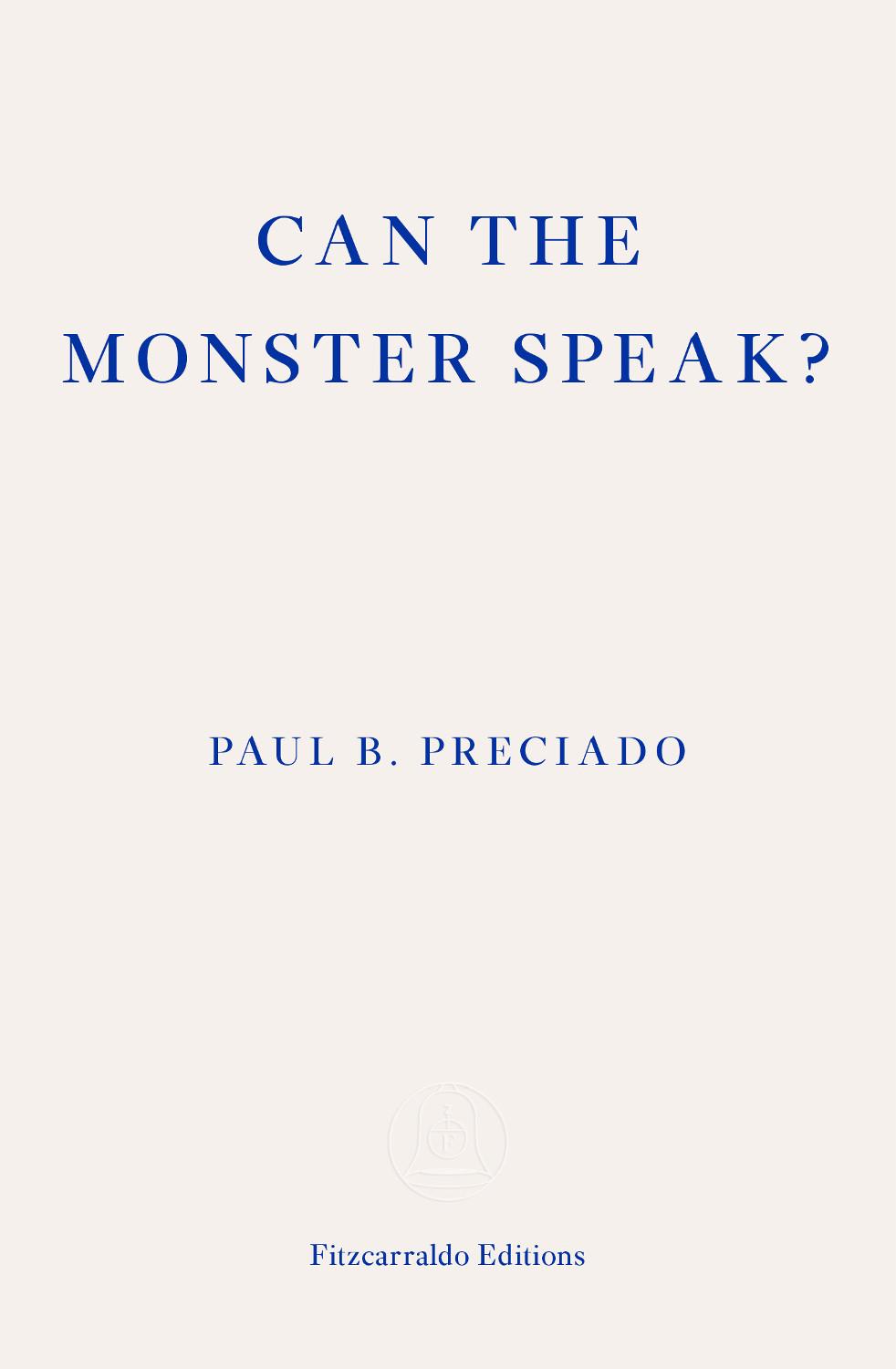
Read here the words of a monster, brought to you unedited and without embellishment! Yes, it is true the monster speaks! But he does not speak the language of castration and penis envy, nor is he fluent in lack and misrecognition. This monster speaks in his own words, and he does not speak as a subject, as an individual but rather as part of a constantly mutating somatheque. The monster announces the fall of the father, the end of Oedipus, the solidarity of the monsters. This short book is powerful, dangerous, important. Read it alone but share it with friends. Whisper its secrets and tell everyone its message the monster of whom you speak, has left his cage.
Jack Halberstam, author of Trans*: A Quick and Quirky Guide to Gender Variability
Drawing on decades of radical trans theory, Preciado presents not just a searing critique of the psychoanalytic establishment, but also a bold challenge to it. Calling for a paradigm shift that will have an impact way beyond its intended field, Can the Monster Speak? demands its audience to think politically, granting new power to previously marginalized voices.
Juliet Jacques, author of Variations
The joy of reading Preciado, whether or not one has the theoretical tools to support or refute him, is the single and singular life that pulses in every word, and speaks to the individual within each of us and not as all too often
to our persona.
Les Inrockuptibles
Written in a mutant language that owes much to Kafka, the master of metamorphoses, this radical text is a welcome insurrection again the psychoanalysts couch.
LOBS
I would like to thank Virginie Despentes for her reading of this text and for her unconditional support.
For Judith Butler
SPEECH GIVEN BY A TRANS MAN
BY A NON-BINARY BODY
BEFORE THE COLE DE LA CAUSE
FREUDIENNE IN FRANCE
On November 17, 2019, I was invited to the Palais des congrs in Paris to give a speech to 3,500 psychoanalysts who had gathered as part of the 49th Study Day of the cole de la Cause Freudienne on the theme Women in psychoanalysis. The speech triggered an earthquake. When I asked whether there was a psychoanalyst in the auditorium who was queer, trans or non-binary, there was silence, broken only by giggles. When I asked that psychoanalytic institutions face up to their responsibilities in response to contemporary discursive changes in the epistemology of sexual and gender identity, half the audience laughed and the other half shouted or demanded that I leave the premises. One woman said, loudly enough that I could hear her from the rostrum: We shouldnt allow him to speak, hes Hitler. Half of the auditorium applauded and cheered. The organizers reminded me that my allocated time had run out, I tried to speed up, skipped several paragraphs, I managed to read only a quarter of my prepared speech.
In the days that followed, psychoanalytic organizations tear each other apart. The cole de la Cause Freudienne is split, the pro- and anti- positions become more sharply defined. The speech, which has been chaotically filmed by dozens of mobile phones, is posted on the internet, fragments of the text are transcribed without anyone requesting my original text, then these are translated into Spanish, Italian and English and published online with little care for the accuracy of the words or the quality of the translations. As a result, approximate versions of the speech now circulate in Argentina, Colombia, Germany, Spain and France. In order to broaden the debate, I would now like to publish the complete text as I would have wished to share it with the gathering of psychoanalysts.
What am I doing here? I have come to terrorize you! I am a monster, you say? No! I am the people! I am an exception? No! I am the rule; you are the exception! You are the chimera; I am the reality!
Victor Hugo, The Man who Laughs (1869), quoted by artist Lorenza Bttner in her thesis Handicapped? (1982)
Contents
Esteemed ladies and gentlemen of the cole de la Cause Freudienne, and I do not know whether it is worth also extending a greeting to all those who are neither ladies nor gentlemen, because I doubt that there is anyone among you who has publicly and legally repudiated sexual difference and been accepted as a fully fledged psychoanalyst, having successfully completed the process you refer to as The Pass, which permits you to practise as an analyst. In this, I am referring to a trans or non-binary psychoanalyst who is accepted by you as an expert. If such a person exists, allow me here and now to offer this dear mutant my warmest greetings.
I have the honour of appearing before the Academy to offer a report on my life as a trans man. I do not know whether I will be able to offer data that you, ladies and gentlemen, academics and psychoanalysts, that you do not already know at first hand, given that you, like me, live within a regime of sex, gender and sexual difference. As a result, almost everything that I can say, you can observe for yourselves on one side or the other of the gender boundary. Although you doubtless consider yourselves to be natural men and women, and such an assumption may have prevented you from observing, from a safe distance, the political framework of which you are part. You will forgive me if, in the course of the story I am about to tell, I do not take for granted the existence of natural masculinity or femininity. Rest assured, you do not have to abandon your beliefs and they are beliefs in order to hear me out. Consider my argument, then go back to your naturalized life, if you can.
To introduce myself, since you are a group of 3,500 psychoanalysts and I feel a little alone on this side of the stage, to take a running jump and hoist myself onto the shoulders of the master of metamorphosis, the greatest analyst of the excesses that hide behind the faade of scientific reason and of the madness commonly referred to as mental health: Franz Kafka.
In 1917, Franz Kafka wrote Ein Bericht fr eine Akademie A Report to an Academy. The narrator of the text is an ape who, having learned human language, is appearing before an academy of the greatest scientific authorities to report to them on what human evolution has meant to him. The ape, who claims to be called Red Peter, explains how he was captured during a hunting expedition organized by the firm of Hagenbeck, transported to Europe aboard a steamship, is trained to perform in music halls, and how he later sprang into the community of human beings. Red Peter explains that in order to master human language and be accepted in the European society of his time, he had to forget his life as an ape. And how, in order to endure this oblivion and the violence of human society, he became an alcoholic. But the most interesting thing in Red Peters monologue is that Kafka does not present this process of humanization as a story of emancipation or of liberation from animality, but rather as a critique of colonial European humanism and its anthropological taxonomies. Once captured, the ape says he had no choice: if he did not wish to die locked up in a cage, he had to accept the cage of human subjectivity.
Just as the ape Red Peter addressed himself to scientists, so today I address myself to you, the academicians of psychoanalysis, from my cage as a trans man. I, a body branded by medical and juridical discourse as transsexual, characterized in most of your psychoanalytic diagnoses as the subject of an impossible metamorphosis, find myself, according to most of your theories, beyond neurosis, on the cusp of or perhaps even within the bounds of psychosis, being incapable, according to you, of correctly resolving an Oedipus complex or having succumbed to penis envy. And so, it is from the position assigned to me by you as a mentally ill person that I address you, an ape-human in a new era. I am the monster who speaks to you. The monster you have created with your discourse and your clinical practices. I am the monster who gets up from the analysts couch and dares to speak, not as a patient, but as a citizen, as your monstrous equal.












